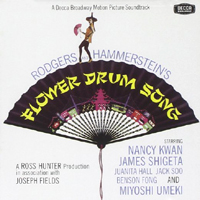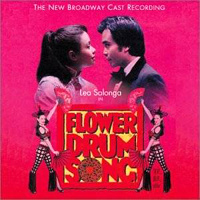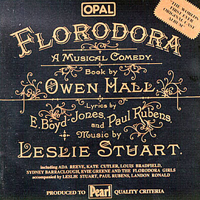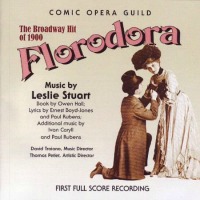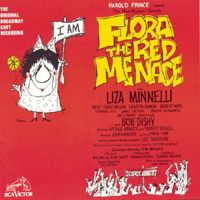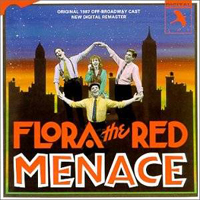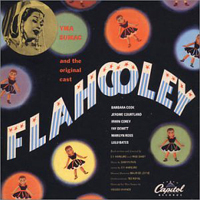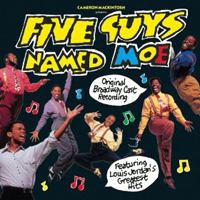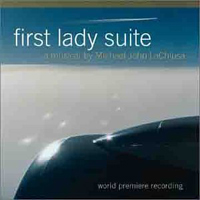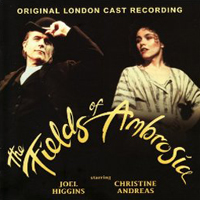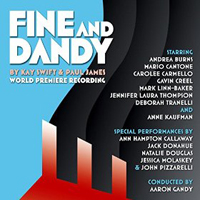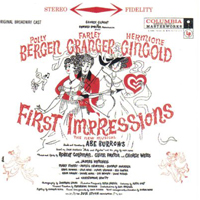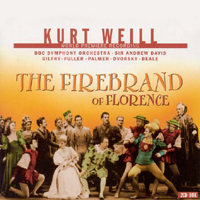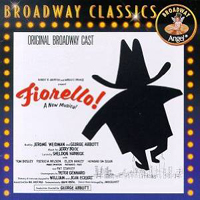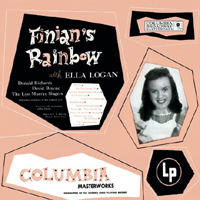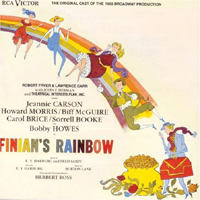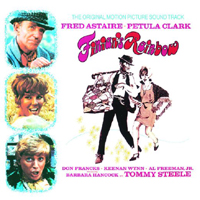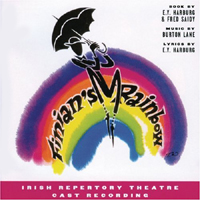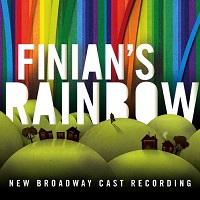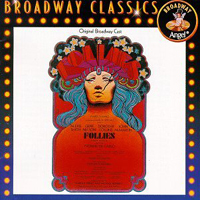 Original Broadway Cast, 1971 (Capitol/Angel/Kritzerland)
Original Broadway Cast, 1971 (Capitol/Angel/Kritzerland)  (4 / 5) To many, Follies is one of the greatest of all shows, possibly the ultimate musical theater piece. Others find it cultishly “interesting,” with a magnificent Stephen Sondheim score compromised by a problematic book. And some, especially those seeking “pure entertainment,” cannot grasp the show’s then-and-now, fact-and-fantasy structure or the juxtaposition of clever pastiche songs with those emanating from four unhappy people. In short, Follies will always be controversial, but those who love it do so with the fiercest devotion. One aspect of the show’s legend that is not open to dispute is that its original cast album is ultimately a pale (if frequently wonderful) reflection of a legendary production. All the great performers are here — Alexis Smith, Dorothy Collins, Gene Nelson, Yvonne De Carlo, Mary McCarty, and the rest — but the decision to edit this lengthy score to fit it on one LP disc was penny-wise and posterity-foolish. On the startling list of total omissions are “Loveland,” “Rain on the Roof,” and nearly all of the show’s dance music. (“One More Kiss,” originally left off the LP, was reinstated for the CD.) Furthermore, many of the songs that are here have damaging internal edits. What is present here is very fine and irreplaceable, including Collins’ aching “Losing My Mind” and De Carlo’s gutsy ”I’m Still Here,” even if both of these songs were among those cut down for the recording. Still, this condensed version of one of the most varied and intelligent scores in Broadway history allows precious little of the flavor of the original Harold Prince-Michael Bennett production to come through. (Note: The Kritzerland CD is a limited edition, remixed and remastered version of the original recording.) — Richard Barrios
(4 / 5) To many, Follies is one of the greatest of all shows, possibly the ultimate musical theater piece. Others find it cultishly “interesting,” with a magnificent Stephen Sondheim score compromised by a problematic book. And some, especially those seeking “pure entertainment,” cannot grasp the show’s then-and-now, fact-and-fantasy structure or the juxtaposition of clever pastiche songs with those emanating from four unhappy people. In short, Follies will always be controversial, but those who love it do so with the fiercest devotion. One aspect of the show’s legend that is not open to dispute is that its original cast album is ultimately a pale (if frequently wonderful) reflection of a legendary production. All the great performers are here — Alexis Smith, Dorothy Collins, Gene Nelson, Yvonne De Carlo, Mary McCarty, and the rest — but the decision to edit this lengthy score to fit it on one LP disc was penny-wise and posterity-foolish. On the startling list of total omissions are “Loveland,” “Rain on the Roof,” and nearly all of the show’s dance music. (“One More Kiss,” originally left off the LP, was reinstated for the CD.) Furthermore, many of the songs that are here have damaging internal edits. What is present here is very fine and irreplaceable, including Collins’ aching “Losing My Mind” and De Carlo’s gutsy ”I’m Still Here,” even if both of these songs were among those cut down for the recording. Still, this condensed version of one of the most varied and intelligent scores in Broadway history allows precious little of the flavor of the original Harold Prince-Michael Bennett production to come through. (Note: The Kritzerland CD is a limited edition, remixed and remastered version of the original recording.) — Richard Barrios
 New York Concert Cast, 1985 (RCA, 2CDs)
New York Concert Cast, 1985 (RCA, 2CDs)  (4 / 5) This concert production at Lincoln Center featured an all-star cast, and the results were dazzling if not perfect. All of the show’s strengths are clear in this nearly complete recording of the Follies score, but there are so many opportunities for big moments by stellar performers that it takes some doing to keep everything in balance. In fact, the balance is decidedly off when Elaine Stritch makes “Broadway Baby” into a weird, disenchanted cousin to “The Ladies Who Lunch.” More in line with the overall concept is a sweet memento from Betty Comden and Adolph Green, who chirp “Rain on the Roof, ” and a grand memento of operatic glories past is diva Licia Albanese in “One More Kiss.”(She’s beautifully paired with the clear-voiced Erie Mills.) Phyllis Newman as Stella is no match for Mary McCarty, nor does Carol Burnett, good as she is, offer a more definitive “I’m Still Here” than Yvonne De Carlo’s original. But Barbara Cook is up to the Dorothy Collins standard; not surprisingly, “Losing My Mind” is one of the highlights of the disc. Lee Remick is engaging as Phyllis, and George Hearn does well as Ben. In the role of Buddy, Mandy Patinkin offers his strange combination of fine singing and irritating self-indulgence. Everyone else delivers the goods acceptably, and the orchestra is no less than the New York Philharmonic, conducted splendidly by Paul Gemignani. — R.B.
(4 / 5) This concert production at Lincoln Center featured an all-star cast, and the results were dazzling if not perfect. All of the show’s strengths are clear in this nearly complete recording of the Follies score, but there are so many opportunities for big moments by stellar performers that it takes some doing to keep everything in balance. In fact, the balance is decidedly off when Elaine Stritch makes “Broadway Baby” into a weird, disenchanted cousin to “The Ladies Who Lunch.” More in line with the overall concept is a sweet memento from Betty Comden and Adolph Green, who chirp “Rain on the Roof, ” and a grand memento of operatic glories past is diva Licia Albanese in “One More Kiss.”(She’s beautifully paired with the clear-voiced Erie Mills.) Phyllis Newman as Stella is no match for Mary McCarty, nor does Carol Burnett, good as she is, offer a more definitive “I’m Still Here” than Yvonne De Carlo’s original. But Barbara Cook is up to the Dorothy Collins standard; not surprisingly, “Losing My Mind” is one of the highlights of the disc. Lee Remick is engaging as Phyllis, and George Hearn does well as Ben. In the role of Buddy, Mandy Patinkin offers his strange combination of fine singing and irritating self-indulgence. Everyone else delivers the goods acceptably, and the orchestra is no less than the New York Philharmonic, conducted splendidly by Paul Gemignani. — R.B.
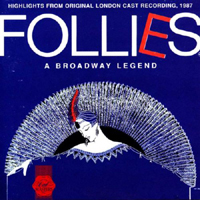 Original London Cast, 1987 (First Night, 2CDs)
Original London Cast, 1987 (First Night, 2CDs)  (4 / 5) Sondheim made considerable alterations to the score for this production. The Prelude and “Bolero d’Amour” were cut, “The Story of Lucy and Jessie” was replaced by an “intellectual striptease” called “Ah, But Underneath,” “The Road You Didn’t Take” was dropped in favor of the intricate Ben/Phyllis duet “Country House,” there was an entirely different “Loveland,” and Ben’s “Live, Laugh, Love” became his exhortation to “Make the Most of Your Music.” As for the leading performers: Diana Rigg is a predictably strong Phyllis, Julia McKenzie is a moving Sally, David Healy does fine as Buddy, and Daniel Massey is solid as Ben. Some of the featured roles are cast with the resonance necessary to any production of Follies; Dolores Gray sings ”I’m Still Here” with much of her plush vocal tone intact, and operetta veteran Adele Leigh quavers her way poignantly through “One More Kiss.” A few of the others struggle too hard to sound American, and the show as a whole seems a little reserved and earthbound. British reticence? Perhaps. At any rate, an ideal Follies may reside only in the minds of those who adore the show. — R.B.
(4 / 5) Sondheim made considerable alterations to the score for this production. The Prelude and “Bolero d’Amour” were cut, “The Story of Lucy and Jessie” was replaced by an “intellectual striptease” called “Ah, But Underneath,” “The Road You Didn’t Take” was dropped in favor of the intricate Ben/Phyllis duet “Country House,” there was an entirely different “Loveland,” and Ben’s “Live, Laugh, Love” became his exhortation to “Make the Most of Your Music.” As for the leading performers: Diana Rigg is a predictably strong Phyllis, Julia McKenzie is a moving Sally, David Healy does fine as Buddy, and Daniel Massey is solid as Ben. Some of the featured roles are cast with the resonance necessary to any production of Follies; Dolores Gray sings ”I’m Still Here” with much of her plush vocal tone intact, and operetta veteran Adele Leigh quavers her way poignantly through “One More Kiss.” A few of the others struggle too hard to sound American, and the show as a whole seems a little reserved and earthbound. British reticence? Perhaps. At any rate, an ideal Follies may reside only in the minds of those who adore the show. — R.B.
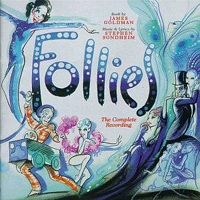 Paper Mill Playhouse Cast, 1998 (TVT, 2CDs)
Paper Mill Playhouse Cast, 1998 (TVT, 2CDs)  (4 / 5) As production costs skyrocketed in the 1990s, a full-scale Broadway revival of Follies seemed an ever decreasing possibility. But the Paper Mill Playhouse, a 45-minutes-from-Broadway theater in Millburn, N.J., mounted a well-received production in 1998. The design values were impressive, and the casting was rich, imaginative, and crammed with Broadway/Hollywood talent: Kaye Ballard, Eddie Bracken, Laurence Guittard, Dee Hoty, Donna McKechnie, Ann Miller, Lilane Montevecchi, Phyllis Newman, Tony Roberts, and Donald Saddler. Some aspects of this revival were certainly arresting. Who, after all, was more qualified to sing “I’m Still Here” than Ann Miller, well into her seventies but still going strong? Who was a more apt “Broadway Baby” than Kaye Ballard? Who could be a more winsome Sally than A Chorus Line sweetheart Donna McKechnie? If not all of this two-CD set lives up to the highlights offered by those performers, it’s good enough to use an example of the ongoing truth that every recording of Follies is fascinating and absolutely necessary in its own way. One caveat about this one: It’s labeled “The Complete Recording,” and an appendix section does offer a wonderful array of songs written for but not included in the original production (plus “The Story of Lucy and Jessie,” which was dropped for the Paper Mill production in favor of “Ah, But Underneath”). But since most of the numbers created for the London version are not here, it isn’t truly complete. Still, why carp? The cast ranges from competent to magnificent, the atmosphere is theatrically solid, and the resonant acoustic is gracious to some of the older singers. — R.B.
(4 / 5) As production costs skyrocketed in the 1990s, a full-scale Broadway revival of Follies seemed an ever decreasing possibility. But the Paper Mill Playhouse, a 45-minutes-from-Broadway theater in Millburn, N.J., mounted a well-received production in 1998. The design values were impressive, and the casting was rich, imaginative, and crammed with Broadway/Hollywood talent: Kaye Ballard, Eddie Bracken, Laurence Guittard, Dee Hoty, Donna McKechnie, Ann Miller, Lilane Montevecchi, Phyllis Newman, Tony Roberts, and Donald Saddler. Some aspects of this revival were certainly arresting. Who, after all, was more qualified to sing “I’m Still Here” than Ann Miller, well into her seventies but still going strong? Who was a more apt “Broadway Baby” than Kaye Ballard? Who could be a more winsome Sally than A Chorus Line sweetheart Donna McKechnie? If not all of this two-CD set lives up to the highlights offered by those performers, it’s good enough to use an example of the ongoing truth that every recording of Follies is fascinating and absolutely necessary in its own way. One caveat about this one: It’s labeled “The Complete Recording,” and an appendix section does offer a wonderful array of songs written for but not included in the original production (plus “The Story of Lucy and Jessie,” which was dropped for the Paper Mill production in favor of “Ah, But Underneath”). But since most of the numbers created for the London version are not here, it isn’t truly complete. Still, why carp? The cast ranges from competent to magnificent, the atmosphere is theatrically solid, and the resonant acoustic is gracious to some of the older singers. — R.B.
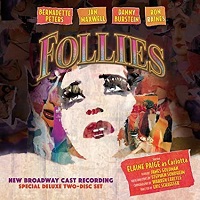 Broadway Cast, 2011 (PS Classics, 2 CDs)
Broadway Cast, 2011 (PS Classics, 2 CDs)  (4 / 5) The success of the Paper Mill Playhouse production played a sizable role in convincing Broadway that a Follies revival was, in fact, feasible. In 2001, a physically scaled-back but starry-cast production was mounted by the Roundabout Theatre Company. It did not earn a commercial recording, and nor did the well-received 2007 Encores! series presentation of the show. But the Follies discography did begin to expand again with the next Broadway production, which originated at the Kennedy Center in Washington D.C. and moved (with a few cast changes) to New York for a limited run. The acclaim that greeted this production was almost drowned out by some hand-wringing over one controversial piece of casting: Bernadette Peters as Sally. Indeed, as the recording indicates, the vulnerability that has always been part of the Peters persona may not always match up with that of the crestfallen Sally, reminding us that not every wonderful performer can be a complete success in every great role. In contrast, the late, Tony-winning Jan Maxwell makes a crisp, perfectly realized Phyllis, and Danny Burstein is an outstanding Buddy. Ron Raines is satisfactory as Ben, and the various cameos are, in general, highly successful. Elaine Paige has no difficulty delivering a powerhouse “I’m Still Here,” Jayne Houdyshell is an endearing Hattie, and as Emily Whitman, Susan Watson is still a charmer more than half a century after Bye, Bye Birdie. Two outstanding turns rate special mention: Terri White’s boffo “Who’s That Woman?” is a track one can happily play over and over, and veteran Met mezzo Rosalind Elias delivers a “One More Kiss” so firm as to make a listener wonder if she’s playing the old Heidi or the young one. (That latter role is beautifully sung by Leah Horowitz.) The recording generously extends over two discs and includes ample dialog. Once again, Follies casts its riveting, too-great-to-be-perfect yet mesmerizing spell. — R.B.
(4 / 5) The success of the Paper Mill Playhouse production played a sizable role in convincing Broadway that a Follies revival was, in fact, feasible. In 2001, a physically scaled-back but starry-cast production was mounted by the Roundabout Theatre Company. It did not earn a commercial recording, and nor did the well-received 2007 Encores! series presentation of the show. But the Follies discography did begin to expand again with the next Broadway production, which originated at the Kennedy Center in Washington D.C. and moved (with a few cast changes) to New York for a limited run. The acclaim that greeted this production was almost drowned out by some hand-wringing over one controversial piece of casting: Bernadette Peters as Sally. Indeed, as the recording indicates, the vulnerability that has always been part of the Peters persona may not always match up with that of the crestfallen Sally, reminding us that not every wonderful performer can be a complete success in every great role. In contrast, the late, Tony-winning Jan Maxwell makes a crisp, perfectly realized Phyllis, and Danny Burstein is an outstanding Buddy. Ron Raines is satisfactory as Ben, and the various cameos are, in general, highly successful. Elaine Paige has no difficulty delivering a powerhouse “I’m Still Here,” Jayne Houdyshell is an endearing Hattie, and as Emily Whitman, Susan Watson is still a charmer more than half a century after Bye, Bye Birdie. Two outstanding turns rate special mention: Terri White’s boffo “Who’s That Woman?” is a track one can happily play over and over, and veteran Met mezzo Rosalind Elias delivers a “One More Kiss” so firm as to make a listener wonder if she’s playing the old Heidi or the young one. (That latter role is beautifully sung by Leah Horowitz.) The recording generously extends over two discs and includes ample dialog. Once again, Follies casts its riveting, too-great-to-be-perfect yet mesmerizing spell. — R.B.
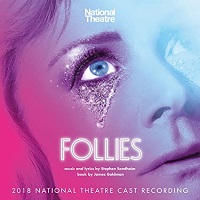 National Theatre Cast, 2018 (Arts Music)
National Theatre Cast, 2018 (Arts Music)  (4 / 5) Now well into the fifth decade of its existence, Follies came back yet again in a lavish, imaginative, and rapturously-received production at London’s National Theater. This is not only the latest major production of the show (at this writing) but is also one of the most widely seen, courtesy of broadcasts in movie theaters. Visually stunning and dramatically penetrating, the NT Follies fares a little less well as a purely auditory experience. Part of the problem comes, once again, with those Brits-striving-to-sound-American inflections. As with the first London recording, only more so, the cast members on this recording work rather conspicuously to convince listeners that they’re as American as, say, Ethel Shutta. The strain, as exacerbated by those intricate Sondheim lyrics, is detectable. Nor, to many listeners, will the entirely competent cast always seem as vocally distinctive as many of their predecessors. Under the direction of Dominick Cooke, the brilliant Imelda Staunton offers a take on the role of Sally that may not be appreciated by everyone but is certainly valid and striking. The other members of the central quartet are all fine, the “turns” are well done, and Tracie Bennett is an insightful Carlotta. There’s also a glimpse of “star glow” in the casting of long-ago movie hunk Gary Raymond as Weismann and opera diva Josephine Barstow as Heidi. In this Follies, the whole matters more than the individual parts, which is as worthy a concept as any bestowed on this iridescent, endlessly meaningful work of art. — R.B.
(4 / 5) Now well into the fifth decade of its existence, Follies came back yet again in a lavish, imaginative, and rapturously-received production at London’s National Theater. This is not only the latest major production of the show (at this writing) but is also one of the most widely seen, courtesy of broadcasts in movie theaters. Visually stunning and dramatically penetrating, the NT Follies fares a little less well as a purely auditory experience. Part of the problem comes, once again, with those Brits-striving-to-sound-American inflections. As with the first London recording, only more so, the cast members on this recording work rather conspicuously to convince listeners that they’re as American as, say, Ethel Shutta. The strain, as exacerbated by those intricate Sondheim lyrics, is detectable. Nor, to many listeners, will the entirely competent cast always seem as vocally distinctive as many of their predecessors. Under the direction of Dominick Cooke, the brilliant Imelda Staunton offers a take on the role of Sally that may not be appreciated by everyone but is certainly valid and striking. The other members of the central quartet are all fine, the “turns” are well done, and Tracie Bennett is an insightful Carlotta. There’s also a glimpse of “star glow” in the casting of long-ago movie hunk Gary Raymond as Weismann and opera diva Josephine Barstow as Heidi. In this Follies, the whole matters more than the individual parts, which is as worthy a concept as any bestowed on this iridescent, endlessly meaningful work of art. — R.B.
 Original Off-Broadway Cast, 1990 (RCA)
Original Off-Broadway Cast, 1990 (RCA)  (4 / 5) In its New York incarnation, Steve Ross’s “Heavenly Musical Hit” Forever Plaid was, if you’ll pardon the expression, a divine tribute to the close-harmony-group singing of the Brill Building-era. The book is about a “guy group,” the Plaids, whose four members perished in a car crash on their way to pick up custom-tailored plaid tuxes for a gig that should have been their first big break. The date was February 9, 1964, and the Plaids were slammed broadside by a school bus filled with Catholic teens bound for Manhattan to join the studio audience for the Beatles’ debut on The Ed Sullivan Show. Now, “through the power of harmony and the expanding holes in the ozone layer in conjunction with the positions of the planets and all that astro-technical stuff,” the deceased Plaids have returned to perform the big show they never got to do. Forever Plaid ran on the Upper West Side for years. Under the direction of creator Ross, who also choreographed, the show’s original cast — Stan Chandler (tenor), David Engel (bass), Jason Graae (baritone), and Guy Stroman (tenor) — was wonderful. The recording was produced by the show’s musical director, James Raitt, with Bill Rosenfield supervising for the label; it captures the performers’ unimpeachable intonation, as well as their verve and comedic flair. The show is a rare combination of wit, hokum, double entendres, and assured musical taste, and in the hands of the original ensemble, it was even touching. The medleys combining “Gotta Be This or That” with “Undecided” (featuring Graae) and “Shangri-La” with “Rags to Riches” (featuring Engel) are standouts, but there’s not a dud track on the disc, which also includes what is surely the most clever, delicious rendition of the Hoagy Carmichael-Frank Loesser chestnut “Heart and Soul” (here featuring Stroman) ever heard. During the 1990s, Forever Plaid became a fixture in several major cities and toured the hinterlands, providing employment to an army of young Equity actors. This cast album is a wonderful souvenir of the original Off-Broadway company. — Charles Wright
(4 / 5) In its New York incarnation, Steve Ross’s “Heavenly Musical Hit” Forever Plaid was, if you’ll pardon the expression, a divine tribute to the close-harmony-group singing of the Brill Building-era. The book is about a “guy group,” the Plaids, whose four members perished in a car crash on their way to pick up custom-tailored plaid tuxes for a gig that should have been their first big break. The date was February 9, 1964, and the Plaids were slammed broadside by a school bus filled with Catholic teens bound for Manhattan to join the studio audience for the Beatles’ debut on The Ed Sullivan Show. Now, “through the power of harmony and the expanding holes in the ozone layer in conjunction with the positions of the planets and all that astro-technical stuff,” the deceased Plaids have returned to perform the big show they never got to do. Forever Plaid ran on the Upper West Side for years. Under the direction of creator Ross, who also choreographed, the show’s original cast — Stan Chandler (tenor), David Engel (bass), Jason Graae (baritone), and Guy Stroman (tenor) — was wonderful. The recording was produced by the show’s musical director, James Raitt, with Bill Rosenfield supervising for the label; it captures the performers’ unimpeachable intonation, as well as their verve and comedic flair. The show is a rare combination of wit, hokum, double entendres, and assured musical taste, and in the hands of the original ensemble, it was even touching. The medleys combining “Gotta Be This or That” with “Undecided” (featuring Graae) and “Shangri-La” with “Rags to Riches” (featuring Engel) are standouts, but there’s not a dud track on the disc, which also includes what is surely the most clever, delicious rendition of the Hoagy Carmichael-Frank Loesser chestnut “Heart and Soul” (here featuring Stroman) ever heard. During the 1990s, Forever Plaid became a fixture in several major cities and toured the hinterlands, providing employment to an army of young Equity actors. This cast album is a wonderful souvenir of the original Off-Broadway company. — Charles Wright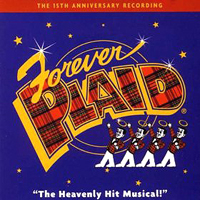 Las Vegas Cast, 2005 (DRG)
Las Vegas Cast, 2005 (DRG)  (4 / 5) Steve Ross’s feather-light revue may be more than a quarter century old, but its selection of mid-century pop songs is forever fresh. If the show’s narrative conceit isn’t also evergreen, that’s likely because subsequent revues have attempted to conjure the Plaid magic and fallen short. (The Marvelous Wonderettes comes immediately to mind, because of the misbegotten 2016 Off-Broadway revival.) Ross is famously proprietary about his franchise, and he has wisely ensured that each iteration of the Plaids — even the Christmas version — is faithful in form and execution to the original. The Las Vegas production preserved on this recording, the second Vegas run of the show, opened in February 2005 and played the Gold Coast Hotel & Casino for two years. The cast consists of Bruce Ewing (Jinx), Doug Frank (Smudge), Mark Perkins (Frankie), and Dale Sandish (Sparky), with J. Gregory Davis as the alternate for Frankie, Smudge, and Sparky. All five men perform on the recording. Admirably precise in intonation and harmony, they replicate the exuberance and naïve charm of the four pros who originated the roles in New York, although in appearance they’re more — umm, how to say it? — mature than their predecessors. David Kanscar on piano and Ken Seiffert on bass make a glorious noise to accompany and complement the fine vocals. As conductor, Kanscar maintains the style, tempi, and dynamics of James Raitt’s expert 1990 musical direction. Produced by Hugh Fordin and Richard Martini, the recording is effectively mixed and features superb aural quality. If a second Forever Plaid is essential for only the most comprehensive collections, the Las Vegas cast recording is a fine alternate for the original. Let’s rejoice that what’s been plaid in Vegas doesn’t have to stay in Vegas! — C.W.
(4 / 5) Steve Ross’s feather-light revue may be more than a quarter century old, but its selection of mid-century pop songs is forever fresh. If the show’s narrative conceit isn’t also evergreen, that’s likely because subsequent revues have attempted to conjure the Plaid magic and fallen short. (The Marvelous Wonderettes comes immediately to mind, because of the misbegotten 2016 Off-Broadway revival.) Ross is famously proprietary about his franchise, and he has wisely ensured that each iteration of the Plaids — even the Christmas version — is faithful in form and execution to the original. The Las Vegas production preserved on this recording, the second Vegas run of the show, opened in February 2005 and played the Gold Coast Hotel & Casino for two years. The cast consists of Bruce Ewing (Jinx), Doug Frank (Smudge), Mark Perkins (Frankie), and Dale Sandish (Sparky), with J. Gregory Davis as the alternate for Frankie, Smudge, and Sparky. All five men perform on the recording. Admirably precise in intonation and harmony, they replicate the exuberance and naïve charm of the four pros who originated the roles in New York, although in appearance they’re more — umm, how to say it? — mature than their predecessors. David Kanscar on piano and Ken Seiffert on bass make a glorious noise to accompany and complement the fine vocals. As conductor, Kanscar maintains the style, tempi, and dynamics of James Raitt’s expert 1990 musical direction. Produced by Hugh Fordin and Richard Martini, the recording is effectively mixed and features superb aural quality. If a second Forever Plaid is essential for only the most comprehensive collections, the Las Vegas cast recording is a fine alternate for the original. Let’s rejoice that what’s been plaid in Vegas doesn’t have to stay in Vegas! — C.W.

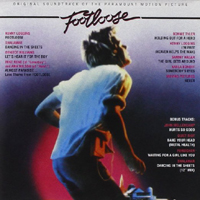
 (3 / 5) Directed by Herbert Ross, with a screenplay by Dean Pitchford, Footloose is about some small-town teenagers who attack a municipal ordinance and do battle with a fundamentalist pastor in an effort to have dancing allowed at their high-school prom. (The plot was inspired by a controversy in Elmore City, Oklahoma, where the 1980 repeal of an anti-dancing law led to the town’s first sock hop in over 100a hundred years.) The film has a superb cast: Kevin Bacon as a big-city kid transplanted to a no-dancing hamlet; Lori Singer as his love interest; John Lithgow as the pinheaded preacher; and Dianne Wiest, Sarah Jessica Parker, and Chris Penn in supporting roles. Pitchford, an accomplished rock lyricist, enlisted Kenny Loggins and several others to collaborate on and perform songs for the movie’s soundtrack. Those songs include Loggins’ rendition of the title number and “I’m Free (Heaven Helps the Man),” Mike Reno and Ann Wilson doing Eric Carmen’s “Almost Paradise,” Deneice Williams singing Tom Snow’s “Let’s Hear It for the Boy,” Karla Bonoff’s rendition of “Sornebody’s Eyes,” Shalamar’s “Dancing in the Sheets,” Sammy Hagar’s “The Girl Gets Around,” Moving Pictures’ “Never,” and Bonnie Tyler’s delicious “Holding Out for a Hero.” The “remastered and enhanced” CD offers four bonus tracks: John Mellencamp’s “Hurts So Good,” Foreigner’s “Waiting for a Girl Like You,” Quiet Riot’s “Bang Your Head,” and a remix of Shalamar’s “Dancing in the Sheets.” — Charles Wright
(3 / 5) Directed by Herbert Ross, with a screenplay by Dean Pitchford, Footloose is about some small-town teenagers who attack a municipal ordinance and do battle with a fundamentalist pastor in an effort to have dancing allowed at their high-school prom. (The plot was inspired by a controversy in Elmore City, Oklahoma, where the 1980 repeal of an anti-dancing law led to the town’s first sock hop in over 100a hundred years.) The film has a superb cast: Kevin Bacon as a big-city kid transplanted to a no-dancing hamlet; Lori Singer as his love interest; John Lithgow as the pinheaded preacher; and Dianne Wiest, Sarah Jessica Parker, and Chris Penn in supporting roles. Pitchford, an accomplished rock lyricist, enlisted Kenny Loggins and several others to collaborate on and perform songs for the movie’s soundtrack. Those songs include Loggins’ rendition of the title number and “I’m Free (Heaven Helps the Man),” Mike Reno and Ann Wilson doing Eric Carmen’s “Almost Paradise,” Deneice Williams singing Tom Snow’s “Let’s Hear It for the Boy,” Karla Bonoff’s rendition of “Sornebody’s Eyes,” Shalamar’s “Dancing in the Sheets,” Sammy Hagar’s “The Girl Gets Around,” Moving Pictures’ “Never,” and Bonnie Tyler’s delicious “Holding Out for a Hero.” The “remastered and enhanced” CD offers four bonus tracks: John Mellencamp’s “Hurts So Good,” Foreigner’s “Waiting for a Girl Like You,” Quiet Riot’s “Bang Your Head,” and a remix of Shalamar’s “Dancing in the Sheets.” — Charles Wright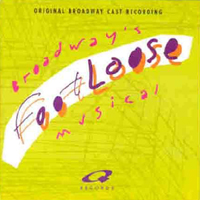
 (1 / 5) When Footloose was adapted as a stage musical, it turned out that the movie’s vintage rock songs, wonderful as they may be, were too closely identified with the performers on the film soundtrack to seem anything but odd in the hands of show-music veterans like Dee Hoty and Broadway babies like Jeremy Kushnier and Jennifer Laura Thompson. Even if their idiom weren’t foreign to this context, the songs from the film, as compared with the ones that Pitchford and Tom Snow wrote expressly for the stage version, are shoehorned, rather than integrated, into the action. On this original cast recording, the really good songs — that is, the ones from the movie — aren’t given their due, and the additional numbers don’t live up to what’s on the soundtrack. — C.W.
(1 / 5) When Footloose was adapted as a stage musical, it turned out that the movie’s vintage rock songs, wonderful as they may be, were too closely identified with the performers on the film soundtrack to seem anything but odd in the hands of show-music veterans like Dee Hoty and Broadway babies like Jeremy Kushnier and Jennifer Laura Thompson. Even if their idiom weren’t foreign to this context, the songs from the film, as compared with the ones that Pitchford and Tom Snow wrote expressly for the stage version, are shoehorned, rather than integrated, into the action. On this original cast recording, the really good songs — that is, the ones from the movie — aren’t given their due, and the additional numbers don’t live up to what’s on the soundtrack. — C.W.





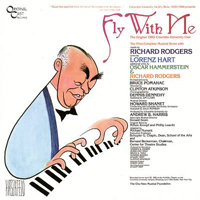
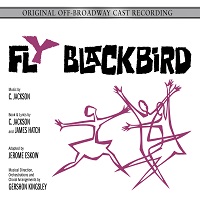
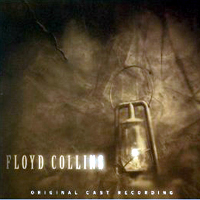
 (5 / 5) In telling this bleak, based-in-truth story of a Kentucky man trapped in a cave and the media circus that surrounds him and his family during the ordeal, composer Adam Guettel — the grandson of Richard Rodgers, and a poster boy for the new wave of American musical theater composers — married bluegrass and classical strains to create an utterly unique sound that echoes with Appalachian authenticity. Some “old school” enthusiasts may not appreciate Guettel’s musical audacity, whether it’s the yodeling in “The Call” or the meandering gorgeousness of “Daybreak.” But the title folk ballad, the rollicking “Riddle Song,” and Floyd’s intensely moving spiritual vision “How Glory Goes” have won over even some of the most hardened purists. As for Guettel’s lyrics, they’re colloquial and character-perfect. (Additional lyrics were contributed by Tina Landau, the author of the show’s book.) This excellent recording preserves the performances of an outstanding cast including Christopher Innvar in the title role, the clarion-voiced Jason Danieley as his brother Homer, and the incomparable Theresa McCarthy as their touched-in-the-head sister. Bruce Coughlin contributes excellent orchestrations that make use of acoustic guitar, banjo, and harmonica in concert with more traditional musical theater instrumentation. — Brooke Pierce
(5 / 5) In telling this bleak, based-in-truth story of a Kentucky man trapped in a cave and the media circus that surrounds him and his family during the ordeal, composer Adam Guettel — the grandson of Richard Rodgers, and a poster boy for the new wave of American musical theater composers — married bluegrass and classical strains to create an utterly unique sound that echoes with Appalachian authenticity. Some “old school” enthusiasts may not appreciate Guettel’s musical audacity, whether it’s the yodeling in “The Call” or the meandering gorgeousness of “Daybreak.” But the title folk ballad, the rollicking “Riddle Song,” and Floyd’s intensely moving spiritual vision “How Glory Goes” have won over even some of the most hardened purists. As for Guettel’s lyrics, they’re colloquial and character-perfect. (Additional lyrics were contributed by Tina Landau, the author of the show’s book.) This excellent recording preserves the performances of an outstanding cast including Christopher Innvar in the title role, the clarion-voiced Jason Danieley as his brother Homer, and the incomparable Theresa McCarthy as their touched-in-the-head sister. Bruce Coughlin contributes excellent orchestrations that make use of acoustic guitar, banjo, and harmonica in concert with more traditional musical theater instrumentation. — Brooke Pierce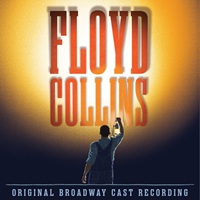

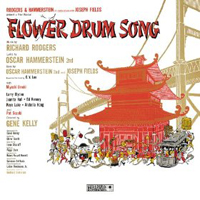
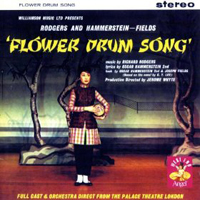
 (2 / 5) As Mei Li and Sammy Fong, Yau Shaun Tung and Tim Herbert aren’t as distinctive as their Broadway counterparts. Surprisingly, this recording really comes to life in the nightclub numbers “Grant Avenue,” “Fan Tan Fannie,” and “Gliding Through My Memoree,” all of which are even bolder than before. Yama Saki gives a vivacious performance as Linda Low; with her strong belt and aggressive manner, she brings a great sense of fun to her songs. While this recording is no substitute for the original, it’s a nice supplement to it. And it’s amusing to note one textual change: On the Broadway album, in “Gliding Through My Memoree,” the nightclub singer tells a chorus girl to say something in Irish, and she replies, “Elin Go Blah!” On the London album, the same request is met with “Blendan Beehan!” — D.B.
(2 / 5) As Mei Li and Sammy Fong, Yau Shaun Tung and Tim Herbert aren’t as distinctive as their Broadway counterparts. Surprisingly, this recording really comes to life in the nightclub numbers “Grant Avenue,” “Fan Tan Fannie,” and “Gliding Through My Memoree,” all of which are even bolder than before. Yama Saki gives a vivacious performance as Linda Low; with her strong belt and aggressive manner, she brings a great sense of fun to her songs. While this recording is no substitute for the original, it’s a nice supplement to it. And it’s amusing to note one textual change: On the Broadway album, in “Gliding Through My Memoree,” the nightclub singer tells a chorus girl to say something in Irish, and she replies, “Elin Go Blah!” On the London album, the same request is met with “Blendan Beehan!” — D.B.